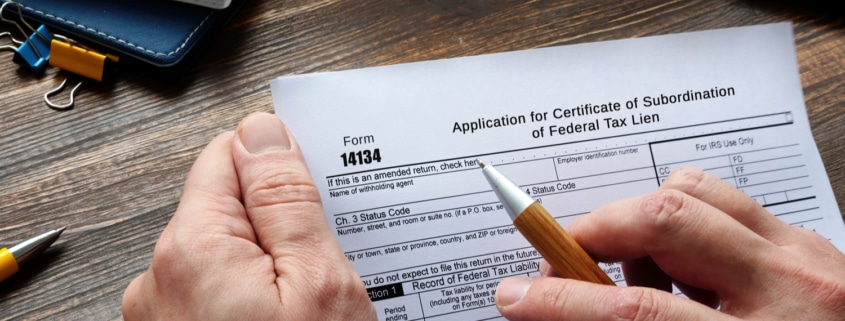Will the IRS Subordinate a Federal Tax Lien?
For those of you who are facing a federal tax lien, you’re aware of the stress and anxiety involved in this difficult situation. While not an immediate collection action, a lien still represents a substantial escalation in the IRS’ attempts to recoup a tax liability and can make it difficult for you to sell or refinance the property.
Obviously, the best way to eliminate a tax lien is to pay off your existing tax debt. Short of that, however, you can request a lien subordination. In this blog, we’re going to discuss when the IRS will subordinate a federal tax lien and how this process could improve your financial situation.
What Is Tax Lien Subordination?
Unlike a tax levy, which is a property seizure enacted to fulfill a tax debt, a lien is a legal claim on your property by the IRS. If you don’t pay your debt within a specified amount of time, the IRS could place a levy to seize your property (including your home, vehicles, bank account, and other assets).
After the IRS has established that you owe a tax liability and sends a notice letter to demand payment, you must either dispute that liability or pay the amount in full. If you do not do so, the IRS will eventually file a Notice of Federal Tax Lien to alert you and your creditors that the government is now your “primary creditor” and has legal rights to your property. Consequently, all other creditors become “junior” creditors whose rights to your property drop behind the IRS in order of priority.
This can make it difficult to receive new or additional loans, as the lender might not want their interest in your property to be secondary to the IRS’ interest.
RELATED: How to Avoid a Maryland State Tax Lien
Why Might Tax Lien Subordination Be Beneficial?
For taxpayers with federal tax liens, subordination can allow junior creditors to move up the list of entities with an interest on a specific piece of property — even above the IRS. The IRS tax lien will still exist for your other forms of real and personal property, and you will still owe your full tax liability (as well as related interest and penalties).
For example, you could subordinate your tax lien to refinance your home mortgage and then use that money to pay your tax lien. The subordination allows the mortgage company to offer the refinancing by giving them the highest interest in your property.
For taxpayers with federal tax liens, subordination can allow junior creditors to move up the list of entities with an interest on a specific piece of property — even above the IRS.
This can be an efficient way for many taxpayers to reduce or eliminate their tax debt, but it could also usher in new financial challenges. Alternative options might include negotiating an offer in compromise or entering into an installment agreement. You should reach out to an experienced tax attorney for sound advice on the best way for you to resolve your tax liability based on your unique circumstances.
How to Apply for Tax Lien Subordination
Applying for tax lien subordination can be a lengthy and challenging process. While it’s in your best interest to work with a highly trained tax professional, here are the essentials.
First, you must complete this form using these directions. In addition, you should provide the IRS with all your related documentation. You will need to submit your application and relevant documentation at least 45 days before your loan settlement meeting.
In most cases, the IRS will agree to provide a Certificate of Subordination under one of two conditions:
- You cover the amount of interest they are subordinating.
- The subordination allows you to increase your IRS payments.
In either case, you need to prove to the IRS that issuing a Certificate of Subordination will help them just as much as it would potentially benefit you — if not more.
If your subordination request is denied, you can either speak with IRS employee who oversaw your request and attempt to convince them to grant the request, or you can file an appeal through the IRS Collection Appeals Program (CAP) using this form.
S.H. Block Tax Services Can Help You Apply for Tax Lien Subordination
If you’re facing a tax lien, tax levy, or any other tax liability issues with the IRS or State of Maryland, S.H. Block Tax Services is here to help. We’ve assisted thousands of taxpayers in decreasing or even eliminating their tax debt and would like the chance to do the same for you.
Please call (410) 872-8376 or complete this brief form today to schedule your free consultation and begin the path to financial freedom.
The content provided here is for informational purposes only and should not be construed as legal advice on any subject.




Leave a Reply
Want to join the discussion?Feel free to contribute!